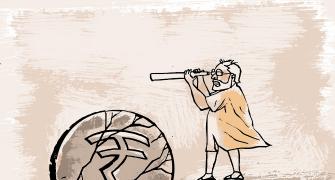While the Reserve Bank and the Economic Survey of the finance ministry have projected India to grow at 6.9 per cent and 6.5 per cent in current fiscal, the International Monetary Fund estimates it to be 6.6 per cent.

Paris-based think tank OECD on Tuesday cut India's growth forecast to 7 per cent for 2016-17 in view of demonetisation, but said the pace will accelerate to 7.3 per cent in the next fiscal.
The Organisation for Economic Cooperation and Development (OECD) had in February last year projected the country's economy to expand at 7.4 per cent in 2016-17.
"India has been a star performer in gloomy times. We do not have many cases of 7 per cent growth... It is a top reformer among all the G-20 countries," OECD secretary-general Angel Gurria told reporters in New Delhi.
The organisation forecast the country's economic growth to rise further to 7.7 per cent in 2018-19.
While the Reserve Bank and the Economic Survey of the finance ministry have projected India to grow at 6.9 per cent and 6.5 per cent in current fiscal, the International Monetary Fund estimates it to be 6.6 per cent.
While complimenting India for its initiatives towards modernising bankruptcy laws and giving states power to undertake reforms, Gurria, cautioned against complacency by policy makers.
"There is no time for complacency. The reform momentum must be maintained," he said, while suggesting that India should take steps to revise the labour laws, handle banks' stressed assets and ease stringent product regulations.
Supporting India's move to demonetise high value currency notes, Gurria said the move might have impacted consumption pattern in that quarter (October-December 2016), but its impact will continue to "bite" in the coming quarters.
"Demonetisation is a very short term mechanism with a visible effect. India will never be the same again post demonetisation... You are moving towards a much less cash society. This will not affect investment or jobs," he said.
Gurria said India has taken important steps to fight the illegal economic activity through a series of steps.
"Demonetisation may have inflicted short term impact on growth, but in long term its effect would include important gains going forward," he said.
With regard to Goods and Services Tax, he said the reform should be put in place as soon as possible because it will spur competitiveness and investment, making India one market.
As a policy prescription, Gurria suggested that the government should raise more revenues from property taxes and personal income tax.
"Less than 6 per cent of population pay personal income tax. There should be fewer exemption and more statutory rates," he said, adding that the benefits of tax reliefs to housing sector are availed of mostly by the better offs.
Photograph: Jitendra Prakash/Reuters







